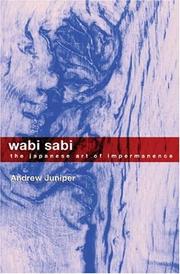Check nearby libraries
Buy this book

Developed out of the aesthetic philosophy of cha-no-yu (the tea ceremony) in fifteenth-century Japan, wabi sabi is an aesthetic that finds beauty in things imperfect, impermanent, and incomplete.
Taken from the Japanese words wabi, which translates to less is more, and sabi, which means attentive melancholy, wabi sabi refers to an awareness of the transient nature of earthly things and a corresponding pleasure in the things that bear the mark of this impermanence. As much a state of mind—an awareness of the things around us and an acceptance of our surroundings—as it is a design style, wabi sabi begs us to appreciate the pure beauty of life—a chipped vase, a quiet rainy day, the impermanence of all things. Presenting itself as an alternative to today's fast-paced, mass-produced, neon-lighted world, wabi sabi reminds us to slow down and take comfort in the natural beauty around us.
In addition to presenting the philosophy of wabi-sabi, this book includes how-to design advice—so that a transformation of body, mind, and home can emerge.
Chapters include:
History: The Development of Wabi Sabi
Culture: Wabi Sabi and the Japanese Character
Art: Defining Aesthetics
Design: Creating Expressions with Wabi Sabi Materials
Spirit: The Universal Spirit of Wabi Sabi
Check nearby libraries
Buy this book

Previews available in: English
Subjects
Wabi, Art and philosophy, Sabi, Japanese Art, Art, japaneseShowing 3 featured editions. View all 3 editions?
| Edition | Availability |
|---|---|
|
1
Wabi Sabi: The Japanese Art of Impermanence
2011, Tuttle Publishing
in English
1462901611 9781462901616
|
zzzz
Libraries near you:
WorldCat
|
|
2
Wabi Sabi: El Arte De La Impermanencia Japones/ the Japenese Art of Impermanence (El Viaje Interior / Inner Journey)
October 14, 2004, Oniro
Paperback
in Spanish
- Tra edition
8497541421 9788497541428
|
zzzz
Libraries near you:
WorldCat
|
|
3
Wabi Sabi: The Japanese Art of Impermanence
November 2003, Tuttle Publishing
Paperback
in English
0804834822 9780804834827
|
aaaa
Libraries near you:
WorldCat
|
Book Details
First Sentence
"THIS QUOTE FROM ALAN WATTS regarding Zen's predecessor, Taoism, captures beautifully the link between religious ideals and wabi sabi's aesthetics."
Classifications
The Physical Object
ID Numbers
Community Reviews (0)
Feedback?History
- Created April 29, 2008
- 12 revisions
Wikipedia citation
×CloseCopy and paste this code into your Wikipedia page. Need help?
| December 8, 2020 | Edited by MARC Bot | import existing book |
| October 8, 2020 | Edited by ImportBot | import existing book |
| August 1, 2020 | Edited by ImportBot | import existing book |
| April 6, 2012 | Edited by ImportBot | import new book |
| April 29, 2008 | Created by an anonymous user | Imported from amazon.com record |












